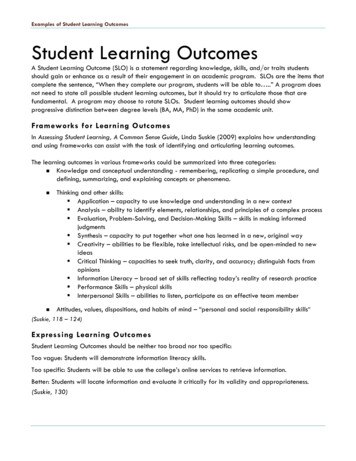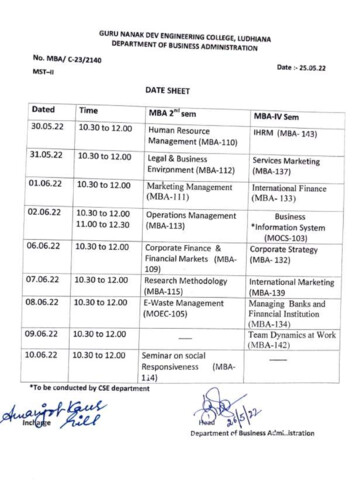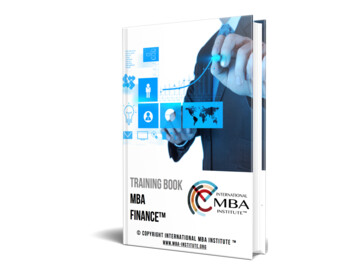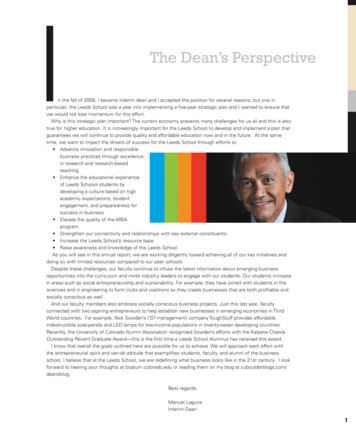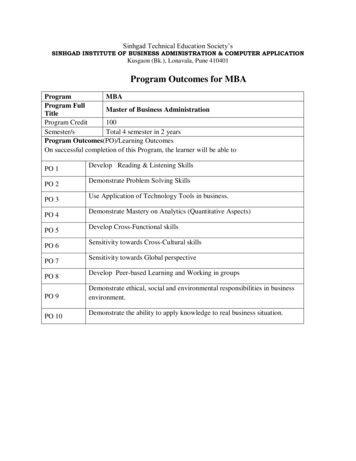
Transcription
Sinhgad Technical Education Society’sSINHGAD INSTITUTE OF BUSINESS ADMINISTRATION & COMPUTER APPLICATIONKusgaon (Bk.), Lonavala, Pune 410401Program Outcomes for MBAProgramMBAProgram FullMaster of Business AdministrationTitleProgram Credit100Semester/sTotal 4 semester in 2 yearsProgram Outcomes(PO)/Learning OutcomesOn successful completion of this Program, the learner will be able toPO 1Develop Reading & Listening SkillsPO 2Demonstrate Problem Solving SkillsPO 3Use Application of Technology Tools in business.PO 4Demonstrate Mastery on Analytics (Quantitative Aspects)PO 5Develop Cross-Functional skillsPO 6Sensitivity towards Cross-Cultural skillsPO 7Sensitivity towards Global perspectivePO 8PO 9PO 10Develop Peer-based Learning and Working in groupsDemonstrate ethical, social and environmental responsibilities in businessenvironment.Demonstrate the ability to apply knowledge to real business situation.
COURSE OUTCOMES MBA SEMESTER IProgrammeCourse Full TitleCourse Short TitleCourse CodeCourse CreditSemesterInternal /ExternalSpecializationCore/ElectiveMBAAccounting For Business DecisionsABD10103IExternalNACoreCourse Outcomes(CO)/Learning OutcomesOn successful completion of this course, the learner will be able toCO 1CO 2CO 3CO 4CO 5CO 6CO 7CO 8Explain the basic concept of financial accounting, cost accounting andmanagement accounting.Apply the tools from accounting and cost accounting this would facilitatethe decision making i.e. Budgeting, Make or Buy decision.Prepare simple final account for sole trader.develop analytical abilities to face the business situations.Explain the basic concept of Cost Accounting and preparation of CostSheet.Apply the concepts of inventory costs, EOQ and inventory control inarriving at decisions related to inventory.Apply the Decision Making tools from Marginal Costing i.e. CVP, BEP.Explain the Standard Costing and Solve problems on material and PriceVariances.
ProgrammeCourse Full TitleCourse Short TitleCourse CodeCourse CreditSemesterInternal /ExternalSpecializationCore/ElectiveMBAEconomic Analysis for Business DecisionEABD1023IExternalCourse Outcomes(CO)/Learning OutcomesOn successful completion of this course, the learner will be able toCO 1CO 2CO 3CO 4CO 5CO 6CO 7CO 8CO 9CO 10CO 11CO 12Explain the circular flow of economic activityDefine the nature of the firm - rationaleDefine the role of profit in market systemElaborate the Adam Smith and Invisible HandExplain the determinants of market demand at firm and industry levelDefine the price- output decision in multi-plant and multi-product firmsElaborate the use of multiple regression for estimating demandExplain the Cost Volume Profit AnalysisDefine the important terms/agencies/approaches/practices related toNational IncomeElaborate the money and capital markets in India.Explain the summarized budget for the current financial year is required.Elaborate the understanding of stock market quotations in financial pressexpected.
ProgrammeCourse Full TitleCourse Short TitleCourse CodeCourse CreditSemesterInternal /ExternalSpecializationCore/ElectiveMBALegal Aspects of BusinessLAB1033IExternalNACoreCourse Outcomes(CO)/Learning OutcomesOn successful completion of this course, the learner will be able toCO 1CO 2CO 3CO 4CO 5CO 6CO 7CO 8CO 9CO 10Differentiate between an Agreement and Contract and explain Obligationsand Rights & Duties of parties involved in ContractExplain the importance Contract in Business Environment and Rights ofParties in case of Discharge of ContractExplain the importance Creation of Agency, roles and responsibilities ofAgent and rights of Principal and Agent, in case of discharge of AgencyDifferentiate between Sale and Agreement to Sale and rights andobligations of the Buyers and SellerPrepare Documents of Title to Goods in various forms of transferdocumentsExplain transfer of properties in curtained and undertrained goodsPrepare different negotiable instruments like Bills of Exchange, PromissoryNote and ChequeExplain conditions of dishonor of negotiable instruments and right of theparty at lossExplain the difference in types of formation of companies underCompanies Amendment Act 2015Explain benefits of Consumer Protection Act in resolution of ConsumerQueries
ProgrammeCourse Full TitleCourse Short TitleCourse CodeCourse CreditSemesterInternal /ExternalSpecializationCore/ElectiveMBABusiness Research MethodBRM1043IExternalNACoreCourse Outcomes(CO)/Learning OutcomesOn successful completion of this course, the learner will be able toCO 1CO 2CO 3CO 4CO 5CO 6CO 7CO 8CO 9CO 10Explain Business Research, Business Intelligence, Research applications infunctional areas of Business and Emerging trends in Business research.Elaborate the Scientific Method of Research, Steps in Research Process,Concept of Scientific Enquiry and Elements of a Research Proposal.Explain the Concept & Features of a good research design and thedifference between Qualitative research and Quantitative researchapproaches.Elaborate Exploratory Research Design, Descriptive Research Designs andExperimental Design.Explain Qualities of a good Hypothesis and Concept of HypothesisTesting.Elaborate Concept of Measurement and Levels of measurement.Explain Attitude Scaling Techniques and Types of Data.Elaborate the concept & need of sampling and types of sampling.Explain about data analysis, Graphical Representation of Data andBivariate Analysis.Elaborate Linear Regression Analysis, Test of Significance and Structureof Research report writing.
ProgrammeCourse Full TitleCourse Short TitleCourse CodeCourse CreditSemesterInternal nal BehaviourOB1053IExternalNACoreCourse Outcomes(CO)/Learning OutcomesOn successful completion of this course, the learner will be able toCO 1CO 2CO 3CO 4CO 5CO 6CO 7CO 8CO 9CO 10CO 11CO 12Explain the importance, scope and functions of Organisational BehaviourDescribe the Evolution of Organisational BehaviourDefine Personality, its importance in Performance,Analyses different types of PersonalityDevelop Right Attitude, Components of attitude, Relationship betweenbehavior and attitudeExplain the importance of Developing Emotional intelligence at theworkplace, Job attitude, Barriers to changing attitudesExplain the Meaning and concept of perception, Factors influencingperception, Selective perceptionExplains the Definition , Concept & therioes of Motive & MotivationExplain the Meaning of Group & Group behavior & Group Dynamics,&team buildingExplain the Concept of Leadership, Styles of Leadership & its approachesDefine Organizational Culture, Stress ManagementExplain meaning, definition & Nature of Organizationa change
ProgrammeCourse Full TitleCourse Short TitleCourse CodeCourse CreditSemesterInternal /ExternalSpecializationCore/ElectiveMBABasic of MarketingBOM1063IExternalNACoreCourse Outcomes(CO)/Learning OutcomesOn successful completion of this course, the learner will be able toCO 1CO 2CO 3CO 4CO 5CO 6CO 7CO 8CO 9Explain Core concepts of marketingDifferentiate Between marketing VS SellingCompany Orientation towards Market PlaceDesign The Marketing MixExplain the role consumer behaviorDemonstrate the Consumer Buying Process.Analyzing the Marketing EnvironmentDesign Segmentation, Target Marketing & PositioningExplain The First Element of Marketing Mix:
ProgrammeCourse Full TitleCourse Short TitleCourse CodeCourse CreditSemesterInternal /ExternalSpecializationCore/ElectiveMBAManagement FundamentalsMF1072IInternalNAElectiveCourse Outcomes(CO)/Learning OutcomesOn successful completion of this course, the learner will be able toCO 1CO 2CO 3CO 4CO 5CO 6CO 7CO 8CO 9CO 10CO 11Explain Approaches to Management like Scientific Approach, SystemsApproach and Contingency Approach.Define bases for departmentationFormulate models of decision makingApply Cultural Diversity and Multi Ethnic WorkforceDefine management and explain the thoughts of various managementthinkers viz F.W.Taylor,Henri Fayol, Elton Mayo, Mary Parker Follet,Rensis Likert, Chestard Bernard, Douglas McGregor, Peter Drucker,Michael Porter and C.K. PrahladDefine and differentiate between centralization and decentralizationTo apply decision making creativityExplain the Principles of Co-ordination-Inter-dependence.Explain organizational Change-Technological ChangeDefine planning and controllingExplain Managerial competencies
ProgrammeCourse Full TitleCourse Short TitleCourse CodeCourse CreditSemesterInternal /ExternalSpecializationCore/ElectiveMBABusiness Communication LabBCL1082IInternalNAElectiveCourse Outcomes(CO)/Learning OutcomesOn successful completion of this course, the learner will be able toCO 1CO 2CO 3CO 4CO 5CO 6CO 7CO 8Explain Principles of effective Communication and Barriers ofCommunication.Explain Cross Cultural Dimensions of Business CommunicationTechnology and Communication, Ethical & Legal Issues in BusinessCommunication.Define Press Release and Press Notes.Elaborate Principles of Effective Presentations, Principles governing theuse of audiovisual media.Master the art of giving interviews in - selection or placement interviews,discipline interviews, appraisal interviews and exit interviews.Give managerial speeches such as speech of introduction, speech of thanks,occasional speech, and theme speech and can give presentations.Explain Principles of Nonverbal Communication.Write Business letters, Routine letters, Bad news and persuasion letters,sales letters and collection letters.
ProgrammeCourse Full TitleCourse Short TitleCourse CodeCourse CreditSemesterInternal /ExternalSpecializationCore/ElectiveMBAMS Excel & Advanced Excel LabMS-Excel1092IInternalNAElectiveCourse Outcomes(CO)/Learning OutcomesOn successful completion of this course, the learner will be able toCO 1CO 2CO 3CO 4CO 5CO 6CO 7CO 8CO 9CO 10Create a workbook , Enter data in a worksheetFormat a worksheet , Format numbers in a worksheet , Create an Exceltable , Filter data by using an AutoFilter , Sort data by using an AutoFilterApply conditional formattingPrint a worksheet , Using Print Preview & Other UtilitiesUse Formulas like VLookup, HLookup, Count, Sum, Subtotal,Creating Formulas for Financial ApplicationsCreate Charts and GraphicsUse Custom Number Formats and Data Tab and Data ValidationAnalyze Data with the Analysis Tool like Anova,Correlation, Covariance,Descriptive StatisticsUse Pivot Tables for Data Analysis
ProgrammeCourse Full TitleCourse Short TitleCourse CodeCourse CreditSemesterInternal /ExternalSpecializationCore/ElectiveMBAEnterprise Analysis & Desk ResearchEADR1152IInternalElectiveCourse Outcomes(CO)/Learning OutcomesOn successful completion of this course, the learner will be able toCO 1CO 2CO 3CO 4CO 5CO 6CO 7CO 8Explain Enterprise History & BackgroundDefine Establishment, Original & Current Promoters, Business Group orBusiness Family to which it belongsAnalyzes Organization Structure, Geographical (domestic and global)foot print – at the time of inception and spread over the yearsDefine Major Customers, customer segments, Products, Product lines,Major Brands, Market ShareDraw Data to be studied, tabulated, graphically depicted ,analyzed andpresentedExplain Listing status & Scrip Codes – BSE and NSE, Global Listings onInternational stock marketExplain Share Price Face Value, Current Market Value, Annual High LowFigures, P/E Ratio, Shareholding PatternExplain Philosophy, Action taken by SEBI and Involvement in Scams
COURSE OUTCOMES MBA SEMESTER IIProgrammeCourse Full TitleCourse Short TitleCourse CodeCourse CreditSemesterInternal /ExternalSpecializationCore/ElectiveMBAMarketing ManagementMM2013IIExternalNACoreCourse Outcomes(CO)/Learning OutcomesOn successful completion of this course, the learner will be able toCO 1CO 2CO 3CO 4CO 5CO 6CO 7CO 8CO 9CO 10Explain New Product Development & Product Life Cycle:Differentiate Product Vs. BrandExplain Factors influencing pricing decisionsExplain Setting the PriceIllustrate Selecting pricing method, Selecting final price.Explain Channel functions & flows, channel levels.Explain Wholesaling, Retailing, Franchising, Direct marketing , ECommerce Marketing PracticesMarket Logistics Decisions:Illustrate the Importance of Promotion Mix.Explain Marketing Planning & Control
ProgrammeCourse Full TitleCourse Short TitleCourse CodeCourse CreditSemesterInternal /ExternalSpecializationCore/ElectiveMBAFinancial ManagementFM20203IIExternalNACoreCourse Outcomes(CO)/Learning OutcomesOn successful completion of this course, the learner will be able toCO 1CO 2CO 3CO 4CO 5CO 6Explain the basic concept of financial management.Apply the tools from financial management this would facilitate thedecision making i.e. Capital Budgeting, Ratio Analysis.develop analytical skills this would facilitate the decision making inbusiness situations.Explain and use of financial analysis techniques i.e. Fund Flow, CashFlow.Estimate working capital requirement of Business concern.Explain the Factors affecting the capital structure and significant role ofCost of Capital
ProgrammeCourse Full TitleCourse Short TitleCourse CodeCourse CreditSemesterInternal /ExternalSpecializationCore/ElectiveMBAHuman Resource ManagementHRM2033IIExternalNACoreCourse Outcomes(CO)/Learning OutcomesOn successful completion of this course, the learner will be able toCO 1CO 2CO 3CO 4CO 5CO 6CO 7CO 8CO 9CO 10CO 11CO 12Explain Nature of HRM, Scope, Functions and Objectives, HRM Policiesand practices.Understand SHRM ModelDesign Human Resource PlanningImplement Recruitment & Selection through different sources & testsMake Career PlanningUndertake Training and Development programs at different levelsMeasure Employee Appraisal & provide CompensationAnalyze Performance feedback,& follow Performance Appraisal MethodsLink compensation with performanceManage Employee RelationsImplement Flexible Work arrangementsMaintain harmonious Industrial Relations &solve Disputes
ProgrammeCourse Full TitleCourse Short TitleCourse CodeCourse CreditSemesterInternal /ExternalSpecializationCore/ElectiveMBADecision ScienceDS2043IIExternalNACoreCourse Outcomes(CO)/Learning OutcomesOn successful completion of this course, the learner will be able toCO 1CO 2CO 3CO 4CO 5CO 6CO 7CO 8Explain Importance of Decision Sciences & Role of quantitative techniquesin decision making.Solve numerical on Assignment Models including special cases inassignment models.Solve numerical on Transportation Models by North West Corner method,Least Cost method, VAM method and Optimal Solution by using MODImethod.Solve numerical on Linear Programming problems by graphical method.Solve numerical on Markov Chains & Simulation Techniques.Solve numerical on Decision Theory, Game Theory and Queuing Theory.Solve numerical on CPM & PERT and Sequencing problems.Solve numerical on Probability and Probability Distributions.
ProgrammeCourse Full TitleCourse Short TitleCourse CodeCourse CreditSemesterInternal /ExternalSpecializationCore/ElectiveMBAOperations & Supply Chain ManagementOSCM2053IExternalNACoreCourse Outcomes(CO)/Learning OutcomesOn successful completion of this course, the learner will be able toCO 1CO 2CO 3CO 4CO 5CO 6CO 7CO 8CO 9CO 10CO 11Explain the importance, scope and functions of Operations and SupplyChain Management in Present ScenarioExplain the term Quality and can related different dimensions of Qualityaffecting customer satisfaction.Explain different operations processes , and identify different types ofprocess-product matrixPrepare a service blue print for given service providing organizationDemonstrate the Production Planning and Control and its functions foreffective and efficient operations managementExplain demand forecasting, production planning tools & productioncontrol toolsPrepare the CRP, DRP, and MRP-II for the given situation and explainimportance of it in productivity of organizationApply the concepts of inventory costs, EOQ and inventory control inarriving at decisions related to inventory controlExplain the importance, scope & functions of and issues & integratedframework in Supply ChainExplain and identify the importance of role of each supply chain partner indelivering maximum satisfaction to customersExplain importance of information flow in both direction of Supply chainfor effective Supply Chain management
ProgrammeCourse Full TitleCourse Short TitleCourse CodeCourse CreditSemesterInternal /ExternalSpecializationCore/ElectiveMBAManagement Information SystemsMIS2063IIExternalNACoreCourse Outcomes(CO)/Learning OutcomesOn successful completion of this course, the learner will be able toCO 1CO 2CO 3CO 4CO 5CO 6CO 7CO 8Explain Need, Purpose and Objectives of MIS.Explain Information as a strategic resource.Use information tools for competitive advantage.Explain Mainframe, Client Server, Web Based, Distributed, Grid andCloud Computing.Explain Networks Types and Topologies of Networks.Define Data Base Management Systems and Relational Data BaseManagement SystemsElaborate Data Warehousing and Data Mining.Define Information Security Control and Quality Assurance.
ProgrammeCourse Full TitleCourse Short TitleCourse CodeCourse CreditSemesterInternal /ExternalSpecializationCore/ElectiveMBAEmotional Intelligence and Managerial Effectiveness LabEI&MEL2072IIInternalCommonElectiveCourse Outcomes(CO)/Learning OutcomesOn successful completion of this course, the learner will be able toCO 1CO 2CO 3CO 4CO 5CO 6CO 7CO 8Explain the emotions and the tripartite brain theory to help them stronginfluence on our behavior.Explicate rational emotive Therapy and emotional transformation.Apply the various theories of learning.Elaborate the Kolb’s Learning Styles and How to create a learningorganization.Explain the basic fundamentals of emotional intelligenceElaborate the benefits of emotional intelligenceExplain challenges faced by organizations& expectations from practicingmanagersExplain the organizational goals, creativity, optimizing resources,execution skills (PDCA cycle)
ProgrammeCourse Full TitleCourse Short TitleCourse CodeCourse CreditSemesterInternal /ExternalSpecializationCore/ElectiveMBALife Skill LabLSL2102IIInternalCommonElectiveCourse Outcomes(CO)/Learning OutcomesOn successful completion of this course, the learner will be able toCO 1CO 2CO 3CO 4CO 5CO 6To encourage students to develop and use balanced self-determinedBehavior.To help students in enhancing self, increasing life satisfaction andImproving relationships with others.To develop new ability to practice new problem solving skills in group anduse these skills in personal life.Explain theory of Cognitive Development , Big Five personalitycharacteristics.Discuss types of coping strategies and difference between empathy andsympathyApply skills like Memorization, Communication Skills.
ProgrammeCourse Full TitleCourse Short TitleCourse CodeCourse CreditSemesterInternal /ExternalSpecializationCore/ElectiveMBAGeopolitics & the World Economic SystemG & WES2112IIInternalNAElectiveCourse Outcomes(CO)/Learning OutcomesOn successful completion of this course, the learner will be able toCO 1CO 2CO 3CO 4CO 5CO 6CO 7CO 8CO 9CO 10CO 11CO 12Explain the importance, scope and functions of International PoliticalEconomyExplain the differences among national economies - market-orientedcapitalismElaborate the Developmental CapitalismElaborate the Social Market CapitalismElaborate the functions of WTO and GATTElaborate the Controversy over Regulation of International FinanceExplain the debate over Free TradeDefine the Trade Blocs such as SAARC, ASEAN, NAFTADefine the International Monetary SystemElaborate the reform of International Monetary AffairsElaborate the International Regime for FDI and MNCExplain the consequences of Economic Globalization
ProgrammeCourse Full TitleCourse Short TitleCourse CodeCourse CreditSemesterInternal /ExternalSpecializationCore/ElectiveMBAIndustry Analysis - Desk ResearchIA-DR2152IIInternalNAElectiveCourse Outcomes(CO)/Learning OutcomesOn successful completion of this course, the learner will be able toCO 1CO 2CO 3CO 4CO 5CO 6CO 7CO 8Analyze the Industry and companies within selected industryExplain Promoters & Management EthosDefine CSR policyExplain External Environment for an industryExplain Recent Developments in industryAnalyze various Mergers & AcquisitionsAnalyze the relevant provisions of latest Exim Policy in case of industriesthat are focused on Global Markets for exports or industries that havesignificant import componentsAnalyze Key Alliances in the past 5 years and their performance & impacton other players in the industry.
COURSE OUTCOMES MBA SEMESTER IIIProgrammeCourse Full TitleCourse Short TitleCourse CodeCourse CreditSemesterInternal /ExternalSpecializationCore/ElectiveMBAStrategic ManagementSM3013IIIExternalGeneral CommonCoreCourse Outcomes(CO)/Learning OutcomesOn successful completion of this course, the learner will be able -12CO-13Explain the importance, scope and concept of Strategy and StrategicManagement Processdifferentiate between Tactics, Strategies and Planning and importance ofeach component in Strategic ManagementPrepare Vision, Mission statements and define goals, objectives fororganizationIdentify Critical Success Factors. Key Performance Indicators and KeyResult Areas for any given service sectorDemonstrate the importance of external environmental analysis as wellprepare PESTLE Analysis and ETOP model for decision makingApply the concepts of BCG matrix and GE9 cell matrix for BusinessPortfolio AnalysisDemonstrate the Porter's 5 Forces Model for Industry EnvironmentalAnalysisPrepare Value Chain Analysis and identify the areas of concern affectingCustomer SatisfactionExplain the importance, Generic Strategies and its role in achievement ofCorporate StrategiesExplain and identify the reasons for failure of Mergers and AcquisitionExplain the importance six sigma and lean six sigma from the point of viewof Success of the OrganizationDemonstrate the importance of Management by Objectives (MBO) andTotal Quality Management (TQM)Explain the meaning of triple bottom line, people planet-profits
ProgrammeCourse Full TitleCourse Short TitleCourse CodeCourse CreditSemesterInternal /ExternalSpecializationCore/ElectiveMBAEnterprise Performance ManagementEPM3023IIIExternalGeneral CommonCoreCourse Outcomes(CO)/Learning OutcomesOn successful completion of this course, the learner will be able toCO 1CO 2CO 3CO 4CO 5CO 6CO 7CO 8CO 9CO 10Explain Concept, Need, Linkages with Strategic Planning, ManagementControl and Operational Control.Explain Concept of Responsibility Centers, Revenue Centre, ExpenseCentre - Engineered and Discretionary costs – Committed costs, ProfitCentre, Investment Centers.Solve problems on Transfer Pricing – Objective, Concept, Methods – Costbased, Market price based & Negotiated, Applicability of Transfer Pricing.Explain Concept, Need, Process of Capital Budgeting.Define Types of capital expenditure decisions – pre-sanction, operationaland post-sanction control of capital expenditure.Explain Performance Evaluation Parameters for Banks: Customer Base,NPAs, Deposits, RoI, Financial Inclusion, Spread, Credit Appraisal,InvestmentsExplain Performance Evaluation Parameters for Retail: ABC analysis, SellExplain Project Control Process: Setting base line plan, Measuring progressand performance.Explain Features of Non-profit organizations, fund accounting,Explain Financial Audit, Internal Audit, Cost Audit, Management Audit
ProgrammeCourse Full TitleCourse Short TitleCourse CodeCourse CreditSemesterInternal /ExternalSpecializationCore/ElectiveMBAStartup and New Venture ManagementSNVM3033IIIExternalGeneral CommonCoreCourse Outcomes(CO)/Learning OutcomesOn successful completion of this course, the learner will be able toCO 1CO 2CO 3CO 4CO 5CO 6CO 7CO 8Explain Concept and Definition of entrepreneur & entrepreneurship.Explain Entrepreneur’s Role, task and Personality.Elaborate the factors which are affecting entrepreneurial growth.Explain the Traits/Qualities of an Entrepreneur.Decide, Develop, manage & recognize the entrepreneurial process.Explain Laws on Liabilities under the Factories Act, Shops &Establishment Act, Industrial Employment (Standing Orders) Act,Environment Protection Act, Sale of Goods Act.Elaborate Role of Support Institutions and Management of Small BusinessSolve case studies of successful / unsuccessful entrepreneurs.
ProgrammeCourse Full TitleCourse Short TitleCourse CodeCourse CreditSemesterInternal /ExternalSpecializationCore/ElectiveMBASummer Internship ProjectSIP3044IIIExternalNACoreCourse Outcomes(CO)/Learning OutcomesOn successful completion of this course, the learner will be able toCO 1CO 2CO 3CO 4CO 5CO 6Acquire on job the skills, knowledge, attitudes, and perceptions along withthe experience needed to constitute a professional identity.Get actual supervised professional experiences.Get insight into the working of the real organizationsDevelop perspective about business organizations in their totality.Explore career opportunities in their areas of interest.Devolve research aptitude
ProgrammeCourse Full TitleCourse Short TitleCourse CodeCourse CreditSemesterInternal y Marketing ResearchCMR305 MKT3IIIExternalMarketing ManagementCoreCourse Outcomes(CO)/Learning OutcomesOn successful completion of this course, the learner will be able toCO 1CO 2CO 3CO 4CO 5CO 6CO 7CO 8Explain the Meaning & role of Marketing ResearchFormulate the hypotheses using exploratory research techniques likeliterature survey, experience survey & analysis of cases.Design questionnaires & observation forms for different marketingresearch situationsExplain the Scaling techniques.Solve the Case studies on sampling decisions like defining universe,sampling unit, sampling element, choice of sampling frame, determiningsample size for probability & non-probability sampling methodsExplain the experimentation in Marketing Research and interpretation ofdata.Test and interpretation of the hypothesis with the techniques like ChiSquare Test, Conjoint Analysis.Explain Cluster Analysis, Multi- dimensional Scaling,Discriminant Analysis
ProgrammeCourse Full TitleCourse Short TitleCourse CodeCourse CreditSemesterInternal /ExternalSpecializationCore/ElectiveMBAConsumer BehaviorCB3063IIIExternalMarketing ManagementCoreCourse Outcomes(CO)/Learning OutcomesOn successful completion of this course, the learner will be able toCO 1CO 2CO 3CO 4CO 5CO 6CO 7Explain Environmental Influences on Consumer BehaviorIllustrate Influence of marketing mix variablesExplain Individual Determinants of Consumer BehaviorIllustrate the Consumer Decision Making ProcessExplain Consumer Behavior ModelsExplain Demographic & Socio-economic ProfileMeasurement of social classes in India using Socio-Economic Classes(SEC) in Urban & Rural Markets
ProgrammeCourse Full TitleCourse Short TitleCourse CodeCourse CreditSemesterInternal /ExternalSpecializationCore/ElectiveMBAIntegrated Marketing CommunicationIMC307 MKT2IIIInternalMarketing ManagementElectiveCourse Outcomes(CO)/Learning OutcomesOn successful completion of this course, the learner will be able toCO 1CO 2CO 3CO 4CO 5Explain IMC, its components, integrated tools of communication and therole of IMC.Elaborate Overview of advertising management, IMC process, advertisingagency, Advertising goals, Advertising budget and Media Selection.Explain the scope and role of sales promotion and Personal selling in IMC.Elaborate Public Relations, Publicity and Corporate Adverting in IMC.Explain Evaluation, Monitoring and Control of IMC programmes.
ProgrammeCourse Full TitleCourse Short TitleCourse CodeCourse CreditSemesterInternal /ExternalSpecializationCore/ElectiveMBAProduct ManagementPM308 MKT2IIIInternalMarketing ManagementElectiveCourse Outcomes(CO)/Learning OutcomesOn successful completion of this course, the learner will be able toCO 1CO 2CO 3CO 4CO 5CO 6CO 7CO 8CO 9Explain the Role of product managerDifferentiate the Product management in consumer product industry andindustrial product industryAccess competitors’ current objectives & strategiesDraw Kano diagram for new product developmentExplain New Product FailureFormulate Product StrategyDefine financial Analysis & Performance Appraisal for ProductmanagementExplain market share, profitabilityExplain Capturing consumer voice , converting it into ideas
ProgrammeCourse Full TitleCourse Short TitleCourse CodeCourse CreditSemesterInternal /ExternalSpecializationCore/ElectiveMBAStrategic Brand ManagementSBM309 MKT2IIIInternalMarketing ManagementElectiveCourse Outcomes(CO)/Learning OutcomesOn successful completion of this course, the learner will be able toCO 1CO 2CO 3CO 4CO 5CO 6CO 7CO 8Explain brand, Branding challenges and opportunities , Brand equityconceptDefine different Brand Equity ModelsElaborate Brand Positioning and Values Brand knowledge, brand equityExplain Four steps of brand building, Creating customer valueDefine Planning and Implementing Brand Marketing ProgramsExplain Integrating marketing communication to build brand equity andConceptualizing the leveraging processElaborate Brand Performance, brand value chain, brand tracking studiesAnalyze Brand architecture, Brand hierarchy, Designing brand strategy,New products, Brand extensions
ProgrammeCourse Full TitleCourse Short TitleCourse CodeCourse CreditSemesterInternal /ExternalSpecializationCore/ElectiveMBACustomer Relationship ManagementCRM312 MKT2IIIInternalMarketing ManagementElectiveCourse Outcomes(CO)/Learning OutcomesOn successful completion of this course, the learner will be able toCO 1CO 2CO 3CO 4CO 5CO 6CO 7Explain Fundamentals of CRMIllustrate CRM, CRM constituencies, Commercial and not-for-profitcontext of CRM, Models of CRM.Explain Managing the Customer Life Cycle:Develop Customer Retention & Development strategiesDevelop Customer Portfolio ManagementDemonstrate Managing
Programme MBA Course Full Title Marketing Management Course Short Title MM Course Code 201 Course Credit 3 Semester II Internal /External External Specialization NA Core/Elective Core Course Outcomes(CO)/Learning Outcomes On successful completion of this course, the learner will be able to CO 1 Explain New Product Development & Product Life .

